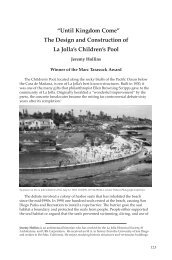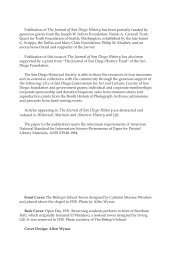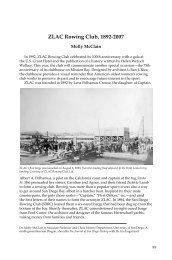The Journal of San Diego History - San Diego History Center
The Journal of San Diego History - San Diego History Center
The Journal of San Diego History - San Diego History Center
You also want an ePaper? Increase the reach of your titles
YUMPU automatically turns print PDFs into web optimized ePapers that Google loves.
Book Reviews<br />
for example, it was police brutality, symbolized by the 1965 disturbances in Watts<br />
that served as catalyst for the Los Angeles chapter. Meanwhile, CASA’s founding<br />
had more to do with economic class and Mexican nationality/identity issues as the<br />
Latino community was comprised heavily <strong>of</strong> working class people with experience<br />
in union politics. For East Wind there was the need to foment change within a<br />
community that presented itself as the “model minority” and ignored indicators <strong>of</strong><br />
inequality based on race.<br />
To Pulido, the fact that each <strong>of</strong> these groups went beyond the issues affecting<br />
their individual communities to embrace a Third World Left perspective seeking<br />
class-based change for all oppressed people <strong>of</strong> color is significant. <strong>The</strong> book seems<br />
wistful <strong>of</strong> what could have been and what could still be possible if the Left could<br />
again find a moment to coalesce against common oppressors. Doing so has never<br />
been easy, however, and Pulido <strong>of</strong>fers a good example why this has been so. In a<br />
chapter on “Patriarchy and Revolution,” Pulido argues that minority women in<br />
the Left had difficulties fighting a revolution on multiple fronts. Despite being an<br />
integral part <strong>of</strong> the mainstream Left’s assault on the capitalist structure, minority<br />
women also had to battle discrimination within the movement from minority men<br />
and white middle class women, all <strong>of</strong> whom <strong>of</strong>ten failed to comprehend the need<br />
to address the gender issues affecting minority women in particular.<br />
Pulido presents a complex story here that should be <strong>of</strong> interest to scholars<br />
in various fields dealing with race and ethnicity, urban studies, and gender. As<br />
for historians, this book can be frustrating at points. For example, it is not clear<br />
whether the three main groups <strong>of</strong> activists all operated contemporaneously. Pulido<br />
mentions that the Black Panther Party was a precursor to the other groups which<br />
can leave one wondering exactly what the group’s status was when CASA and East<br />
Wind were increasingly active. Nevertheless, readers <strong>of</strong> history will find much to<br />
like about the book; in particular, the section exploring the 1940s and 1950s as the<br />
formative era <strong>of</strong> residential segregation goes a long way in explaining neighborhood<br />
patterns <strong>of</strong> today.<br />
Earning My Degree: Memoirs <strong>of</strong> an American University President. By David Pierpont<br />
Gardner. Berkeley, CA: University <strong>of</strong> California Press, 2005. Epilogue, bibliography,<br />
illustrations, appendices, index, and notes. ix + 432 pp. $40.95 cloth.<br />
Reviewed by Christopher J. Lucas, Pr<strong>of</strong>essor <strong>of</strong> Research Methods and Policy<br />
Studies, College <strong>of</strong> Education and Health Pr<strong>of</strong>essions, University <strong>of</strong> Arkansas-<br />
Fayetteville<br />
David Gardner’s account <strong>of</strong> his long association with the University <strong>of</strong> California<br />
avoids most <strong>of</strong> the egoism, false modesty, and special pleading sometimes<br />
found in auto biographical reminiscences. Eminently readable and instructive<br />
throughout, Earning My Degree <strong>of</strong>fers a revealing if sometimes disturbing look<br />
at American academe and its vicissitudes in the waning years <strong>of</strong> the twentieth<br />
century, as seen through the self-reported career <strong>of</strong> one <strong>of</strong> its most distinguished<br />
contemporary leaders.<br />
David Gardner had a lengthy association with the University <strong>of</strong> California as a<br />
167






![[PDF] The Journal of San Diego History Vol 52: Nos 1 & 2](https://img.yumpu.com/25984149/1/172x260/pdf-the-journal-of-san-diego-history-vol-52-nos-1-2.jpg?quality=85)

![[PDF] The Journal of San Diego History - San Diego History Center](https://img.yumpu.com/25984131/1/172x260/pdf-the-journal-of-san-diego-history-san-diego-history-center.jpg?quality=85)







